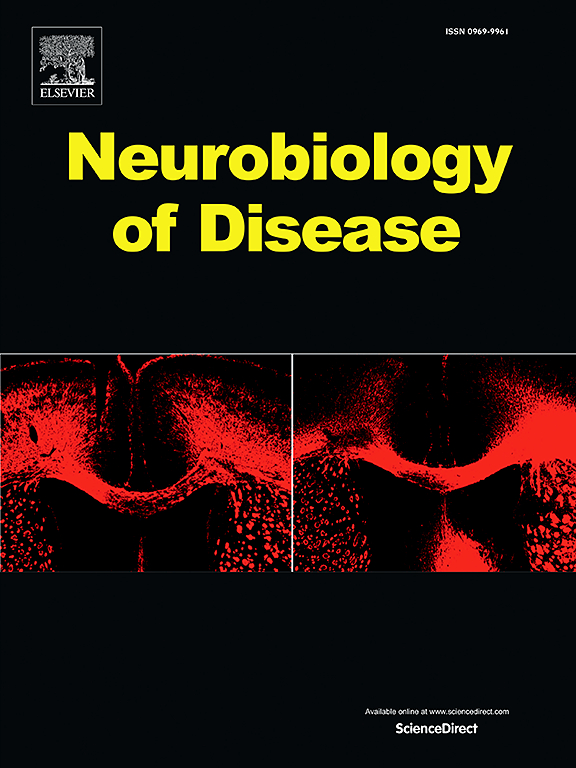Compromised retinoic acid receptor beta expression accelerates the onset of motor, cellular and molecular abnormalities in a mouse model of Huntington’s disease
IF 5.1
2区 医学
Q1 NEUROSCIENCES
引用次数: 0
Abstract
The mechanisms underlying detrimental effects of mutant Huntingtin on striatal dysfunction in Huntington’s disease (HD) are not well understood. Although retinoic acid receptor beta (RARβ) emerged recently as one of the top regulators of transcriptionally downregulated genes in the striatum of HD patients and mouse models, its involvement in disease progression remains elusive. Here we challenged functional relevance of RARβ dysregulation in HD onset and progression. Using a series of genetic mouse models, we investigated whether genetically reduced Rarβ expression synergizes with disease- causing mutant huntingtin (mHTT) fragment in R6/1 mice to accelerate HD-like behavioral, cellular and molecular striatal deregulations. We report that genetically compromised Rarβ signaling accelerates onset of motor abnormalities in the R6/1 HD mouse model. Transcriptional profiling revealed that downregulation of Rarβ expression in Rarβ+/-; R6/1 mice also accelerates transcriptional signature of disease progression and aging by emergence of a cluster of upregulated genes related to cell-cycle, stem cell maintenance and telencephalon development, contributing thereby to degradation of striatal cell-identity. Reactivation of proliferative activity in the neurogenic niche and development-related transcriptional programs in the striatum prompt an attempt of lineage infidelity in HD striatum which may lead as a consequence to disease-driving energy crisis, as suggested by downregulation of oxidative phosphorylation genes, a well-accepted correlate of HD physiopathology, and a metabolic condition required for maintenance of proliferative activity and differentiation but not compatible with high energetic demand of differentiated and active neurons. Overall, our data indicate that RARβ delays disease progression, perhaps by delaying aging process.

在亨廷顿氏病小鼠模型中,维甲酸受体β表达受损加速了运动、细胞和分子异常的发生。
突变的亨廷顿蛋白对亨廷顿病(HD)纹状体功能障碍的有害影响的机制尚不清楚。尽管视黄酸受体β (RARβ)最近成为HD患者和小鼠模型纹状体中转录下调基因的顶级调节因子之一,但其在疾病进展中的作用仍是难以捉摸的。在这里,我们挑战了RARβ失调在HD发病和进展中的功能相关性。通过一系列小鼠遗传模型,我们研究了R6/1小鼠中Rarβ表达的基因减少是否与致病突变亨廷顿蛋白(mHTT)片段协同作用,以加速hd样行为、细胞和分子纹状体的失调。我们报道,基因受损的Rarβ信号会加速R6/1 HD小鼠模型中运动异常的发生。转录谱分析显示Rarβ+/-表达下调;R6/1小鼠还通过出现一组与细胞周期、干细胞维持和端脑发育相关的上调基因来加速疾病进展和衰老的转录特征,从而导致纹状体细胞身份的退化。神经源性生态位增殖活性的重新激活和纹状体中与发育相关的转录程序提示HD纹状体的谱系不忠,这可能导致疾病驱动的能量危机,正如氧化磷酸化基因的下调所表明的那样,这是一种被广泛接受的HD生理病理相关。这是一种维持增殖活性和分化所需的代谢状态,但与分化和活跃神经元的高能量需求不相容。总的来说,我们的数据表明RARβ可能通过延缓衰老过程来延缓疾病进展。
本文章由计算机程序翻译,如有差异,请以英文原文为准。
求助全文
约1分钟内获得全文
求助全文
来源期刊

Neurobiology of Disease
医学-神经科学
CiteScore
11.20
自引率
3.30%
发文量
270
审稿时长
76 days
期刊介绍:
Neurobiology of Disease is a major international journal at the interface between basic and clinical neuroscience. The journal provides a forum for the publication of top quality research papers on: molecular and cellular definitions of disease mechanisms, the neural systems and underpinning behavioral disorders, the genetics of inherited neurological and psychiatric diseases, nervous system aging, and findings relevant to the development of new therapies.
 求助内容:
求助内容: 应助结果提醒方式:
应助结果提醒方式:


